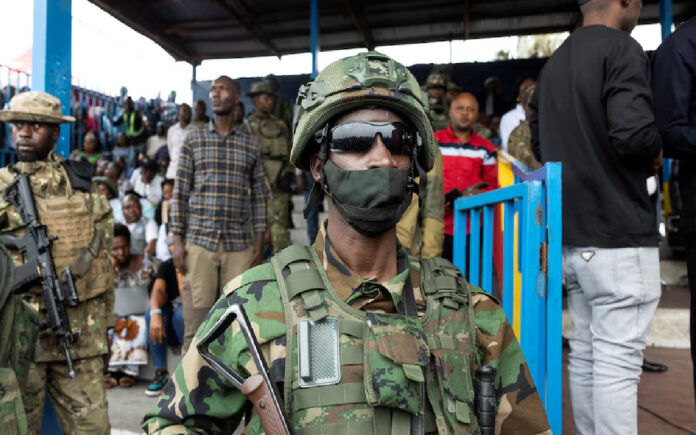Kigali: Rwandan-backed M23 rebels have reportedly entered Bukavu, the second-largest city in the eastern Democratic Republic of Congo (DRC), marking a significant escalation in the ongoing conflict. Corneille Nangaa, leader of the Congo River Alliance, which includes the M23, confirmed their entry on Friday evening, stating that their operation to “clean up the city” would continue the next day.
Earlier on Friday, the Congolese army acknowledged that M23 fighters had seized control of Kavumu airport, located north of Bukavu, prompting government troops to withdraw with their equipment. The advance follows the M23’s capture of Goma, the largest city in eastern Congo, at the end of the previous month.
The fall of Bukavu, the capital of South Kivu province, would mark an unprecedented expansion of M23-controlled territory since the insurgency reignited in 2022. It would also deal a severe blow to the Kinshasa government’s authority in the volatile eastern region.
Rwandan-backed M23 rebels in eastern Democratic Republic of Congo have taken control of the strategic Kavumu airport that serves Bukavu, the region's second biggest city, the rebel alliance and a civil security source said https://t.co/TT0r87xoWZ pic.twitter.com/z1vPMO47HS
— Reuters (@Reuters) February 14, 2025
Rebels Seen in Bukavu Streets
Two residents of Bagira, a northern district of Bukavu, reported seeing M23 rebels in the streets. One resident, Helene, noted that their uniforms were distinct from those of Congolese forces. “We had been prepared since the daytime for their arrival … the FARDC (army soldiers) had left. There were no clashes,” she said.
The Congolese army has yet to issue an official response regarding the developments. However, earlier in the day, army spokesperson Sylvain Ekenge confirmed that troops had pulled back following the loss of the airport. While he did not specify their new location, both Congolese and Burundian forces were observed withdrawing from Bukavu’s primary military base, Camp Saio. A UN source and a local resident indicated that the troops were retreating to avoid clashes in densely populated areas.
A Congolese officer stationed at Camp Saio, speaking anonymously, confirmed that some, though not all, soldiers had left.
Humanitarian Concerns Grow
The escalation in Bukavu has intensified humanitarian concerns, with the United Nations warning of a worsening crisis. The UN reported an influx of displaced civilians moving towards Bukavu, a city already struggling to accommodate nearly 1.3 million residents.
Tshisekedi Warns of Regional Spillover
Amid the escalating conflict, Congolese President Felix Tshisekedi is rallying international support to contain the crisis. Speaking at the Munich Security Conference, he cautioned that the conflict could spread beyond the DRC’s borders.
“Of course, this could lead to a spillover in the region,” he warned, reiterating calls for Rwanda to be held accountable. “It is up to the international community to prevent this conflict from spreading.”
Rwanda, however, has consistently denied accusations from the DRC, the United Nations, and Western governments that it is actively supporting M23. Kigali claims it is defending itself against the Democratic Forces for the Liberation of Rwanda (FDLR), a Hutu-led militia it accuses of collaborating with the Congolese army.
Also Read | Sudan’s RSF Attacks Famine-Stricken Zamzam Camp as Battle Lines Harden
Diplomatic and Political Repercussions
The crisis is expected to be a key agenda item at the African Union summit in Addis Ababa over the weekend. President Tshisekedi will not attend, instead sending his prime minister to represent the DRC.
Domestically, Tshisekedi is facing mounting pressure. While battles rage in the east, the past week has seen an increased military presence in Kinshasa, located roughly 1,600 km (1,000 miles) west of Goma, according to a Reuters correspondent.
In Munich, Tshisekedi accused former President Joseph Kabila of conspiring with Rwanda to destabilize the country.
“The real sponsors (of the conflict) are hiding. And the real sponsor of this opposition is my predecessor, Joseph Kabila,” he claimed.
Responding to the allegations, Barbara Nzimbi, Kabila’s communications adviser, dismissed the claims outright. “I completely deny these accusations. But that’s Mr. Tshisekedi’s policy—to find a scapegoat rather than provide a solution.”



